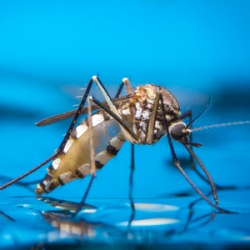Malaria is a notoriously tricky infectious disease. Because of a unique genetic flexibility, it is able to change surface proteins, avoiding the immune response and greatly complicating vaccine development. Furthermore, the parasite is transmitted by mosquitoes, which are difficult to control. Insecticides work, but mosquitoes can develop resistance to them.
One method widely used to control malaria is for governments or charities to provide families with insecticide-treated bed nets. Overall, this strategy is very successful, and it has been credited with preventing some 451 million cases of malaria in the past 15 years. But bed nets are not successful everywhere. In some parts of the world, mosquitoes develop “behavioral resistance”; i.e., they learn to avoid bed nets by biting people earlier in the day.
A team led by Lisa Reimer of the Liverpool School of Tropical Medicine monitored mosquito behavior in villages in Papua New Guinea before (2008) and after (2009-2011) the distribution of bed nets. Data from one of the villages, Mauno, depicts a very noticeable shift in mosquito feeding behavior.
Before bed nets were distributed in 2008, the median biting time for mosquitoes was around midnight. After the distribution, the median time shifted back to 10 pm. Also, a greater proportion of mosquitoes took their dinner even earlier, from 7 to 9 pm.
Worryingly, it’s unclear whether the bed nets were effective at preventing malaria transmission. The number of bites per person per night dropped after the introduction of bed nets, but started to climb in subsequent years as mosquitoes began to adapt. Additionally, the prevalence of malaria infection in humans — arguably, the only statistic that actually matters — dropped in one village, remained the same in a second, and ticked up slightly (albeit insignificantly) in a third.
Despite the mixed results in Papua New Guinea, Dr Reimer believes that bed nets should continue to be used worldwide as part of a mosquito control strategy. However, she notes that behavioral resistance may prove just as vexing as insecticide resistance and, in some locations, may limit the efficacy of bed nets.
Thus, mosquitoes must be monitored for both behavioral and insecticide resistance, as the little creeps stubbornly refuse to die and may be cleverer than we thought.
Source: Edward K. Thomsen et al. “Mosquito behaviour change after distribution of bednets results in decreased protection against malaria exposure.”
Source : Acsh.org




